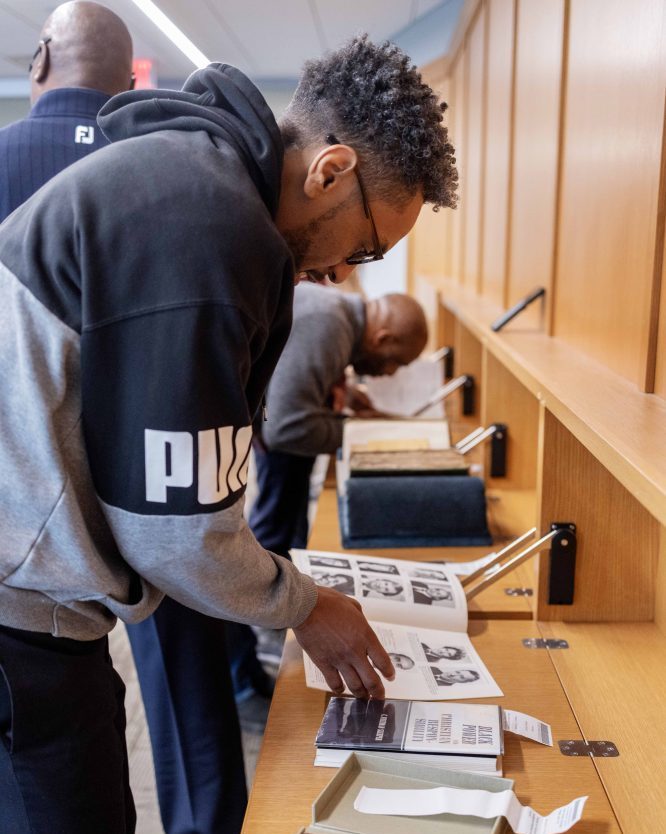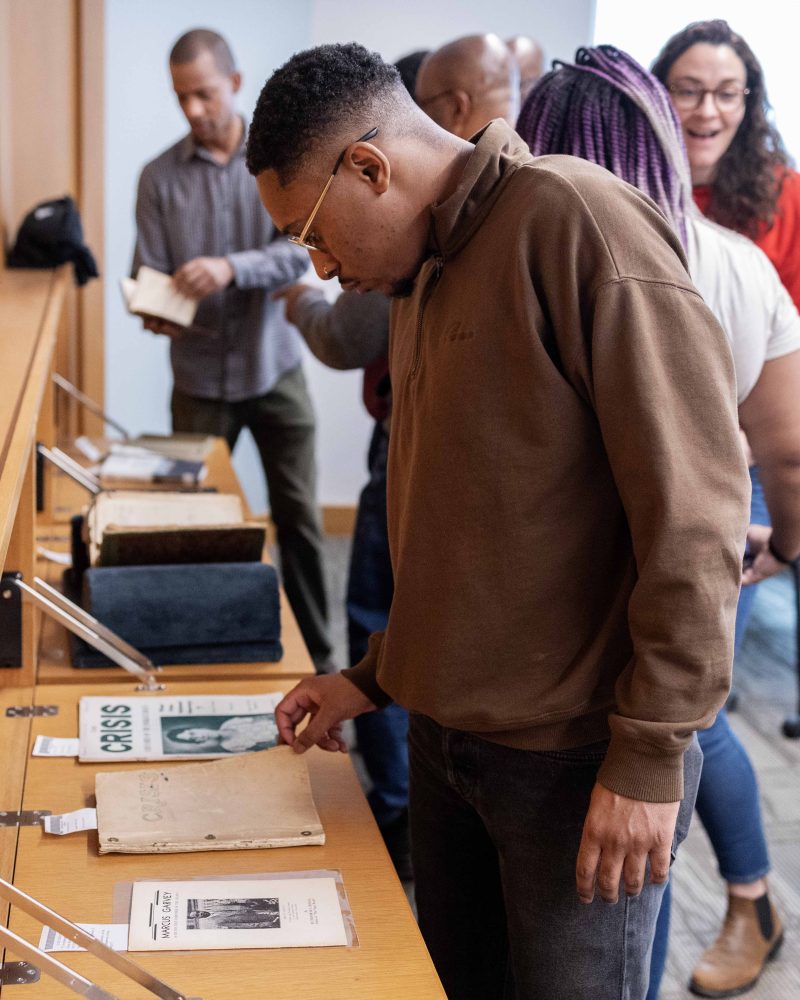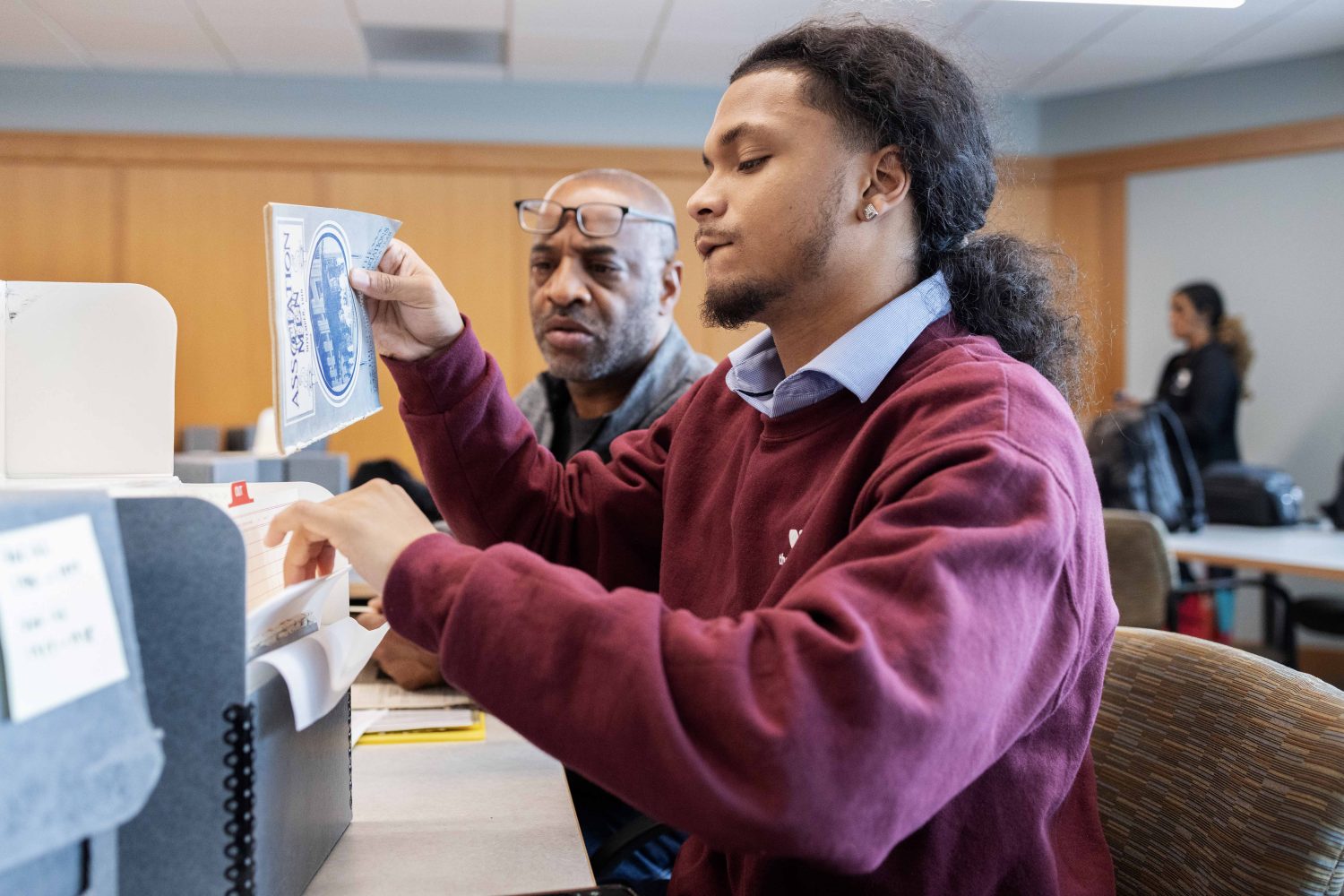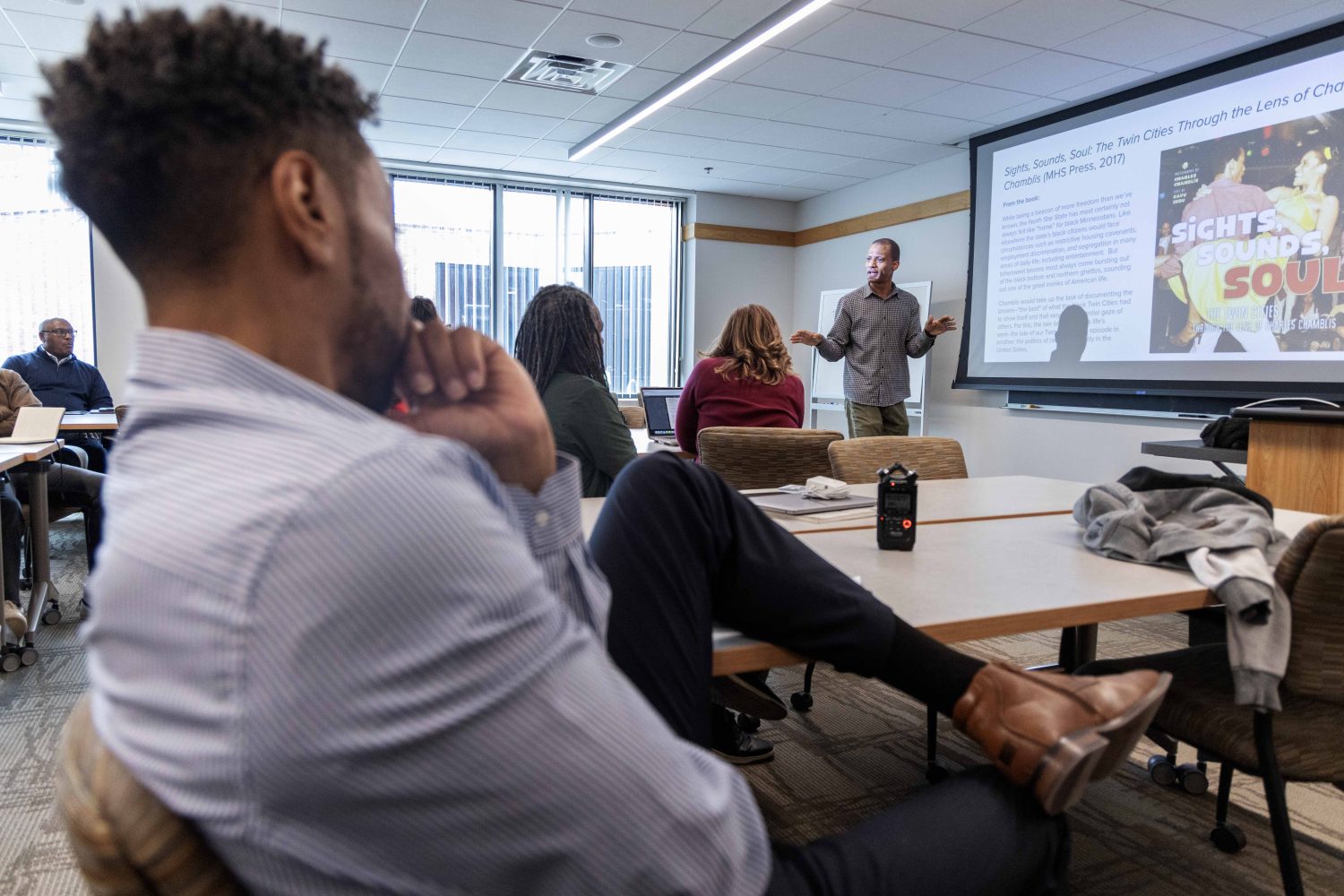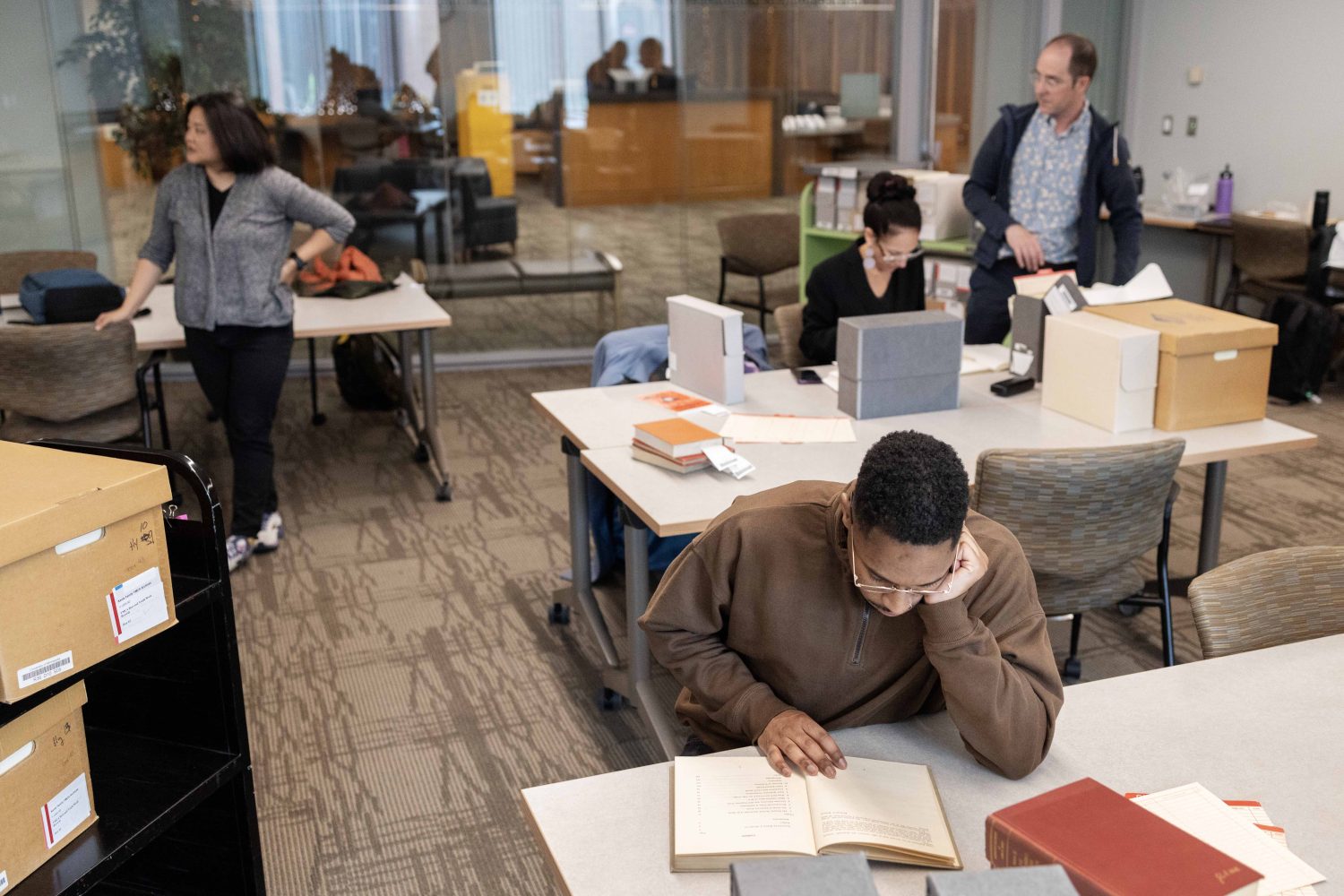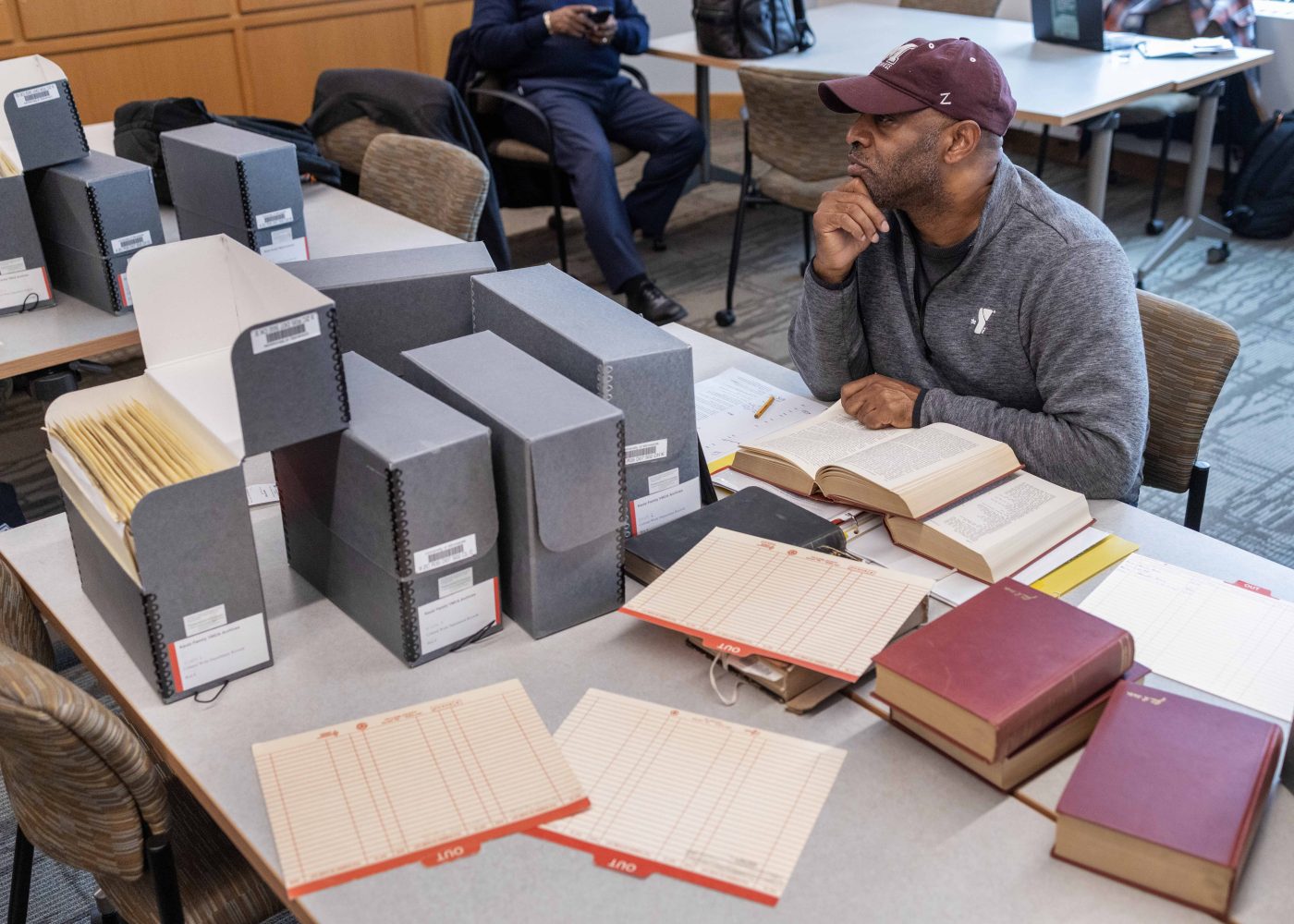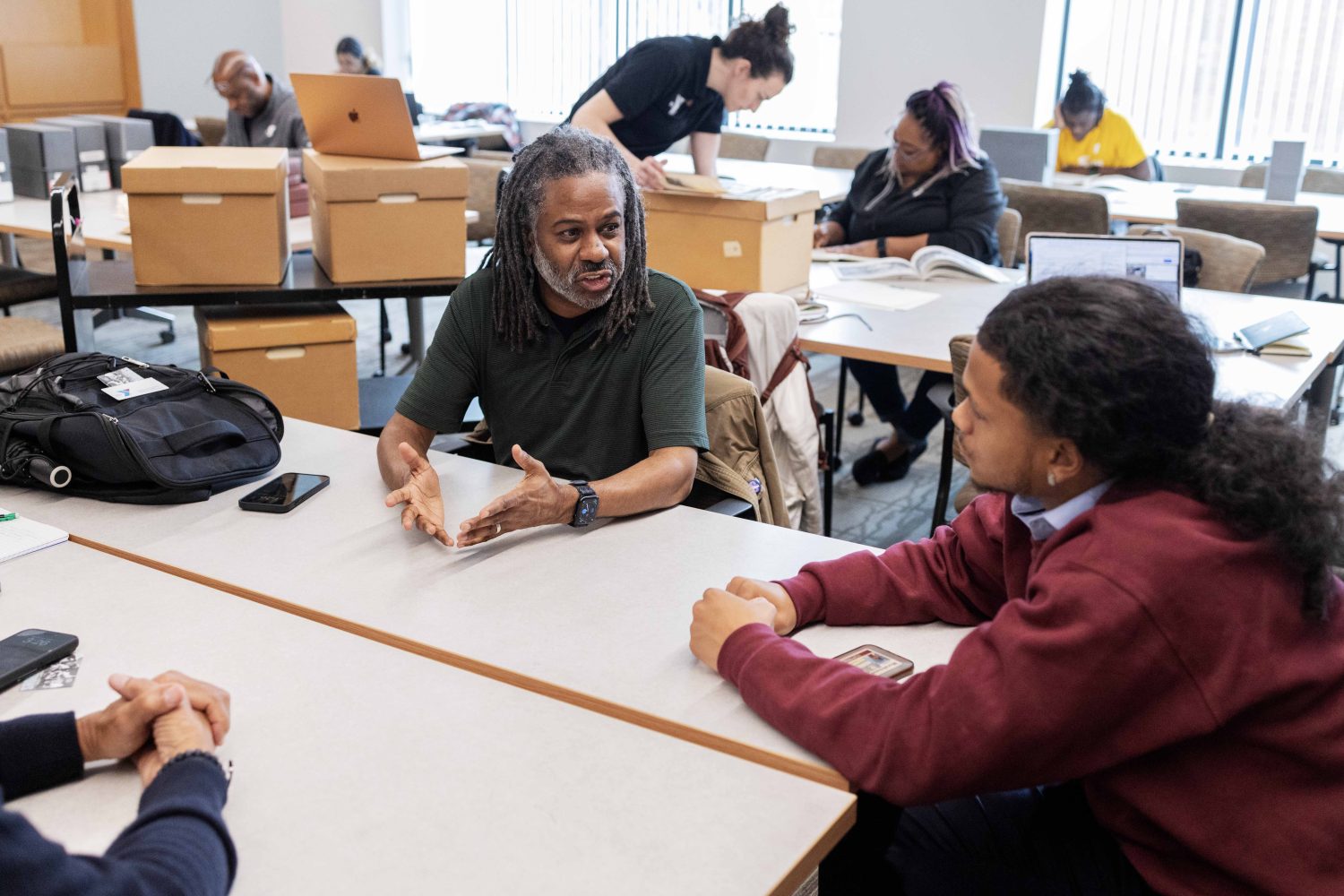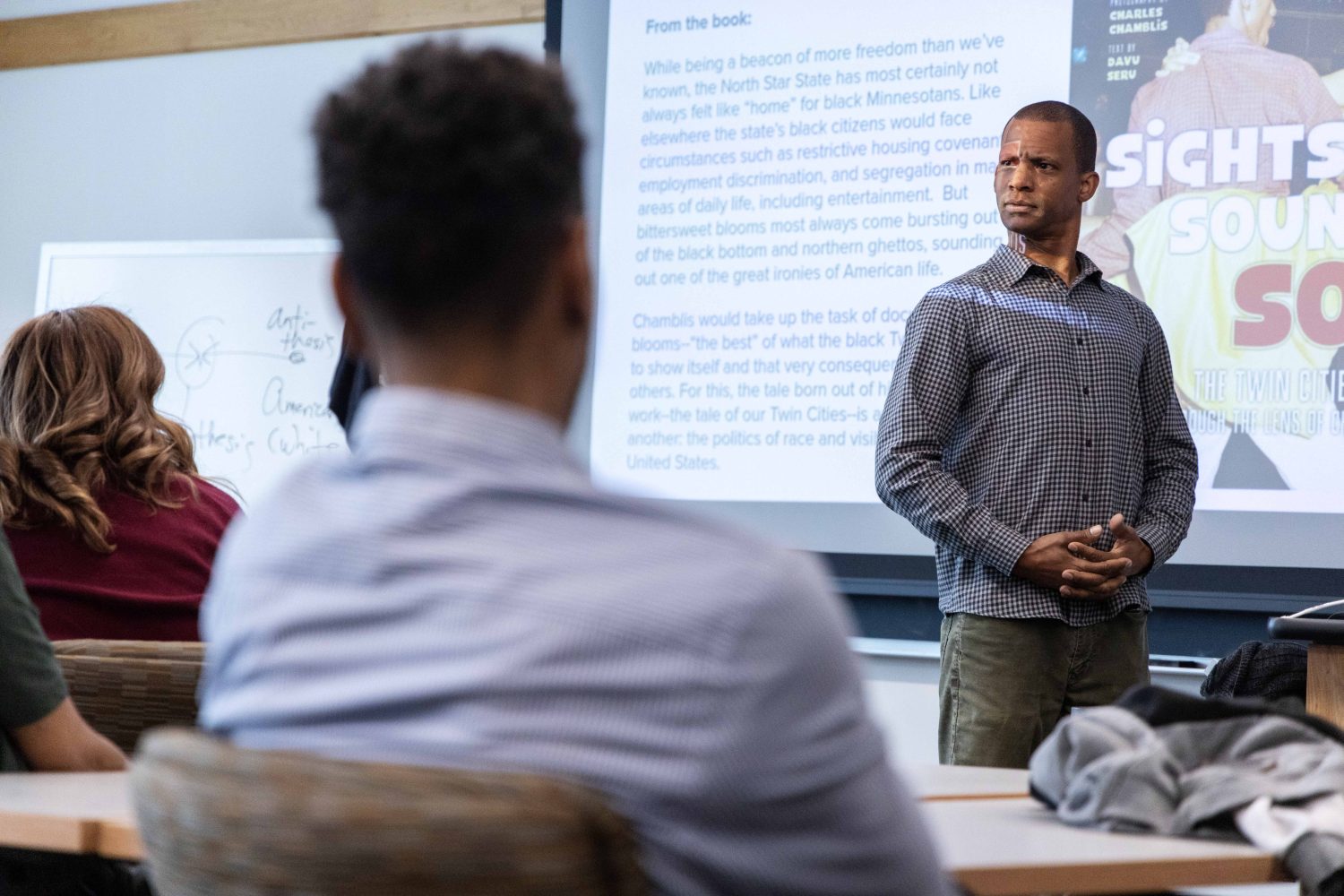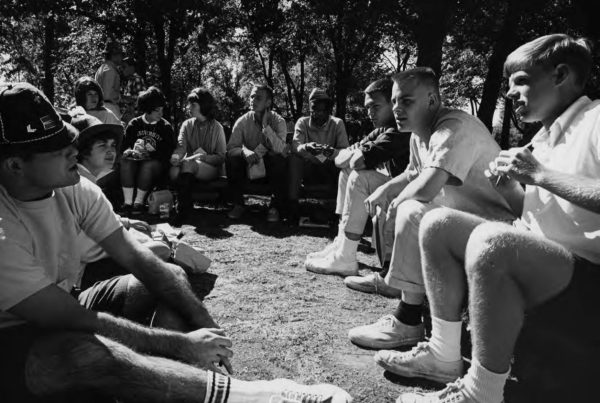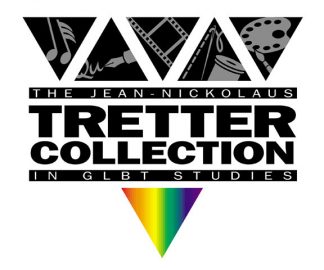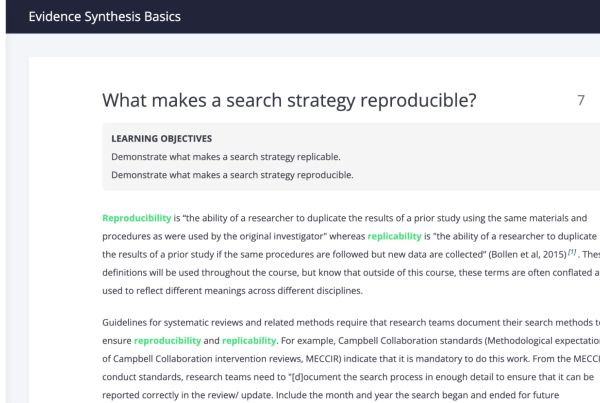Michael DeVaul knows what young Black boys are facing. He grew up in Evanston, Illinois, back when there were two local YMCAs: one for white people, and one for everyone else.
DeVaul spent much of his formative years, from 8 to 18 years old, in his hometown Y, through closure of the “Black Y” and integration with the Grove Street Branch Y. After college, he agreed to work there for two years. Forty-two years later, he’s still at the Y.
“I came to work for community, and the Y was a tool for me to do that,” DeVaul said. “I was able to find myself in the work and not lose myself.”
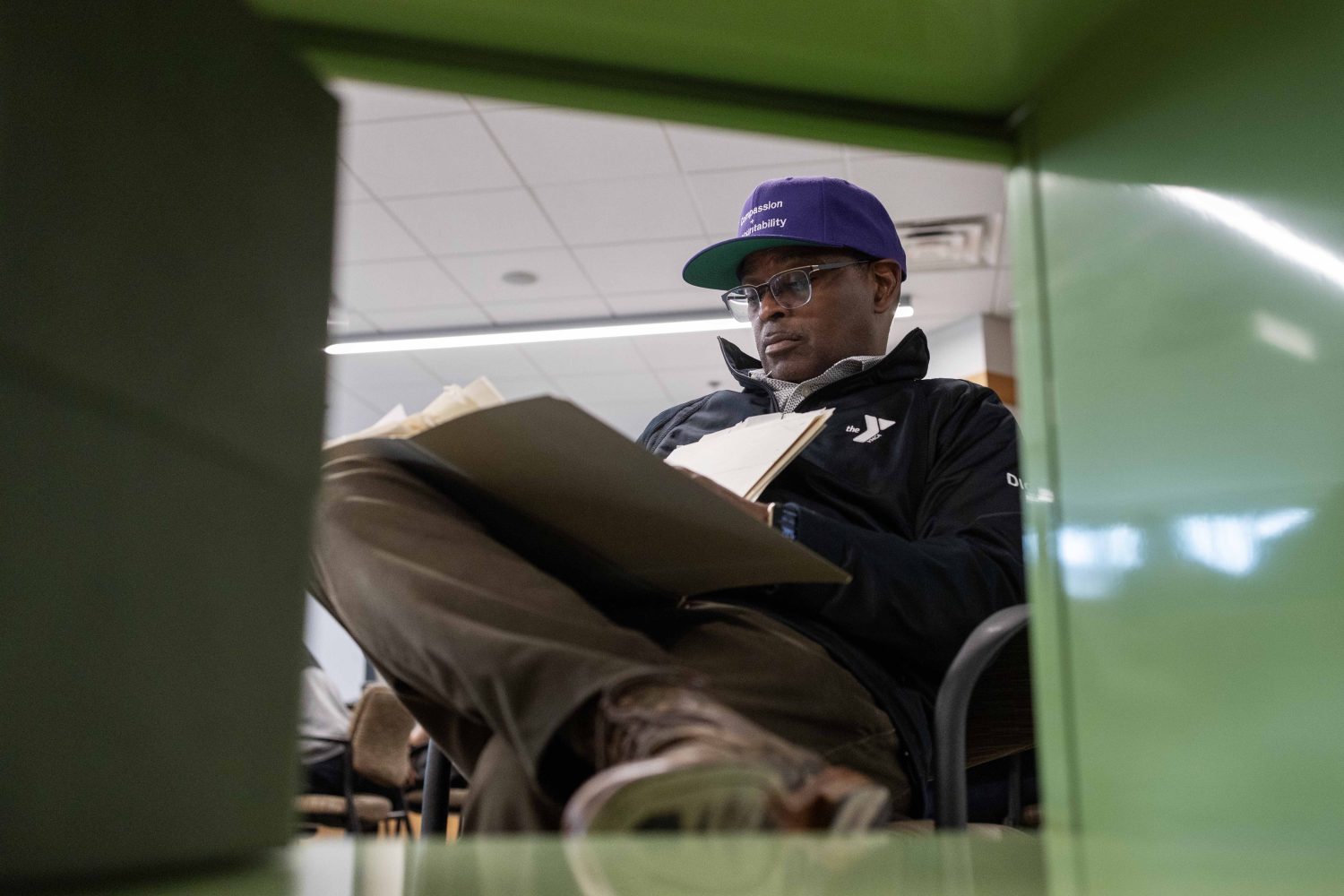
Michael DeVaul, national director of Boys and Young Men of Color, looks through materials from the Kautz Family YMCA Archives, on Wednesday, April 17, 2024. (Photo/Adria Carpenter)
DeVaul is the national director of the Y’s Boys and Young Men of Color (BYMOC) program. He’s been with the program since its inception around six years ago; it’s his way of giving back to the community what it gave him in his adolescence.
He remembers learning that young Black men are more likely to grow up in poverty, more likely to live in impoverished neighborhoods, more likely to sink into poverty as adults, regardless of their background. And when we thought of his own two sons, Cole and Beau, he knew he had to do something.
“Boys are not broken, the system is broken. And if you fix the adult systems, then you can repair the fragmentation that we’ve created between our systems and our boys,” DeVaul said.
The program helps boys and young men of color develop social and emotional intelligence, a sense of agency and identity, and set them on a career pathway. It also seeks to increase grades and attendance, and reduce school suspensions. Currently BYMOC reaches over 4,000 boys in 52 different cities, with plans to reach 10,000 boys and 100 cities by 2025.
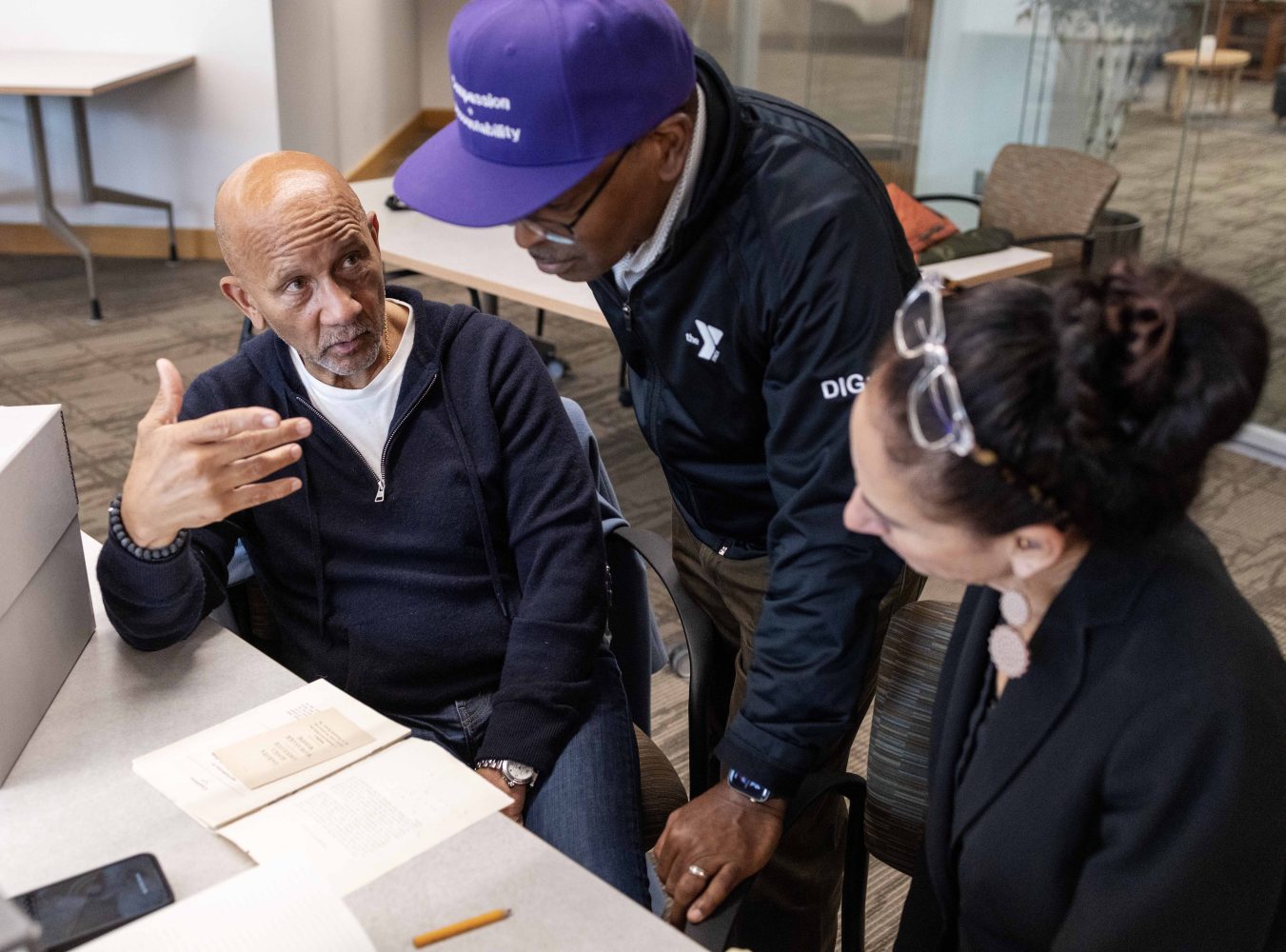
Charles Collins, president emeritus of the YMCA of San Francisco, Michael DeVaul, national director of Boys and Young Men of Color, and Charlene Lyons, president of YMCA of the Treasure Coast in Stuart, Florida, talk in the Kautz Family YMCA Archives, on Wednesday, April 17, 2024. (Photo/Adria Carpenter)
But instead of reinventing the wheel, the program is looking into history, the starting point for innovations, to find a nucleus they can use to build and reimagine the future. To that end, the BYMOC History Scholars fellowship invited 10 Y professionals, who each work with youth of color, into the Kautz Family YMCA Archives at the University of Minnesota “to create a usable past.”
“Something happened in the past in history that we can learn from, and that we can bring back forward,” said Devin Anglin, national coordinator for BYMOC.
Over eight months, the fellows will each work on a topic relevant to their work, their YMCA, and their community, learning the historical context behind their chosen issue and how the past continuously influences the Y’s programs and services. The fellowship will culminate with a final capstone project that will be deposited back into the archives.
“You can’t be apathetic in a time period that’s going through rigorous innovation, because that innovation could be going backwards, not forwards,” DeVaul said. “You got to do something.”
Finding your reflection in leadership
As a high school senior, Quentin Francis started noticing educational disparities between young Black men like himself and his peers. But it was until his undergraduate years at Eastern Michigan University that he understood how educational policies shaped the lives of K-12 students. And he wanted to do something about it.
“Education and youth development became how I wanted to make the world a better place,” Francis said.
After finishing his master’s degree in educational equity at the University of Michigan, Francis decided to take a break from research. He wanted to work directly with teenagers, so he took a position as the director of youth development at the Ann Arbor YMCA.
Unlike other Y team members, especially those who work there long-term, Francis doesn’t have the quintessential “Y story.” He grew up in Columbus, Ohio, and never went to any Y after-school programs or summer camps. But he quickly fell in love with the culture and community at the Ann Arbor Y.
“They really want you to go after your passion and have an impact,” he said.
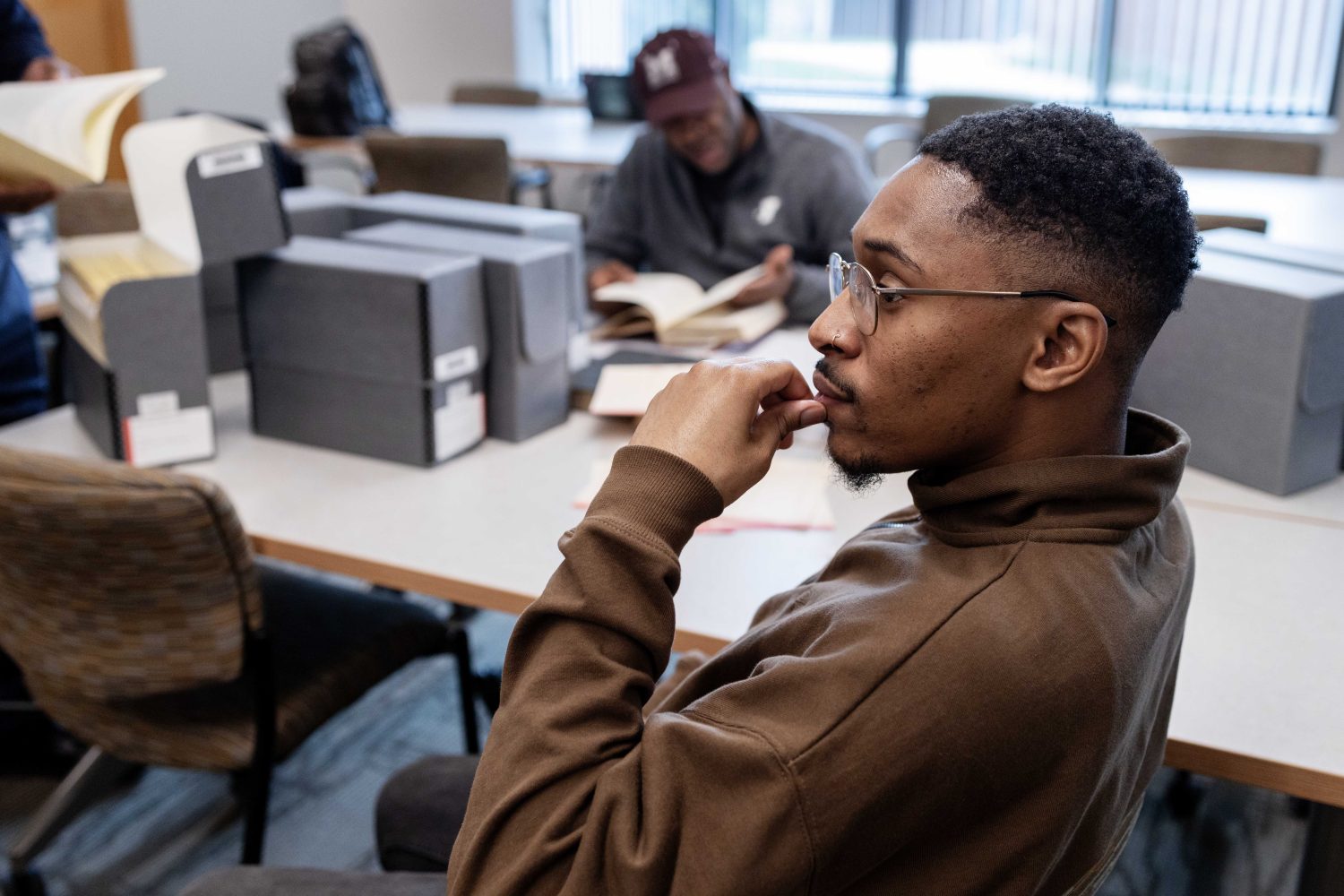
Quentin Francis, director of youth development at the Ann Arbor YMCA in Michigan, takes a moment to think during the fellowship program on Wednesday, April 17, 2024. (Photo/Adria Carpenter)
For him that means running the teen department and programs like the Youth Volunteer Corps, or sustainability and climate control. And it also means learning how the Y can best help boys and young men of color in the area.
Francis joined the fellowship to research leaders and educators of color, specifically if the Y had ever heavily invested in hiring and training youth development leaders who are not only BIPOC, but also uniquely skilled in working with boys and young men of color.
“A lot of boys and young men of color need educators and development leaders that look like them,” he said.
Teachers of color often improve educational outcomes for students of color, increasing math and reading achievement, increasing graduation rates, and lowering rates of suspension and expulsion, according to the U.S. Department of Education. They also serve as strong role models and can develop more trusting relationships with students of color.
The how-to guide on working with BYMOC
While Francis couldn’t find specific information on BIPOC educators and leaders, he instead uncovered manuals, created by the Y in its infancy, about how they developed and trained leaders to work with boys.
This inspired him to create an updated manual – aimed at youth development leaders like teachers and tutors, but also camp counselors, program directors, and mentors – about helping boys and young men of color.
The manual will explain why it’s important to focus on boys and young men of color, what circumstances and issues need more attention, and it’ll provide practical skills for leaders to practice and implement to better reach these young boys, because “intent doesn’t equal impact,” Francis explained. Some leaders might not have the necessary experience or expertise.
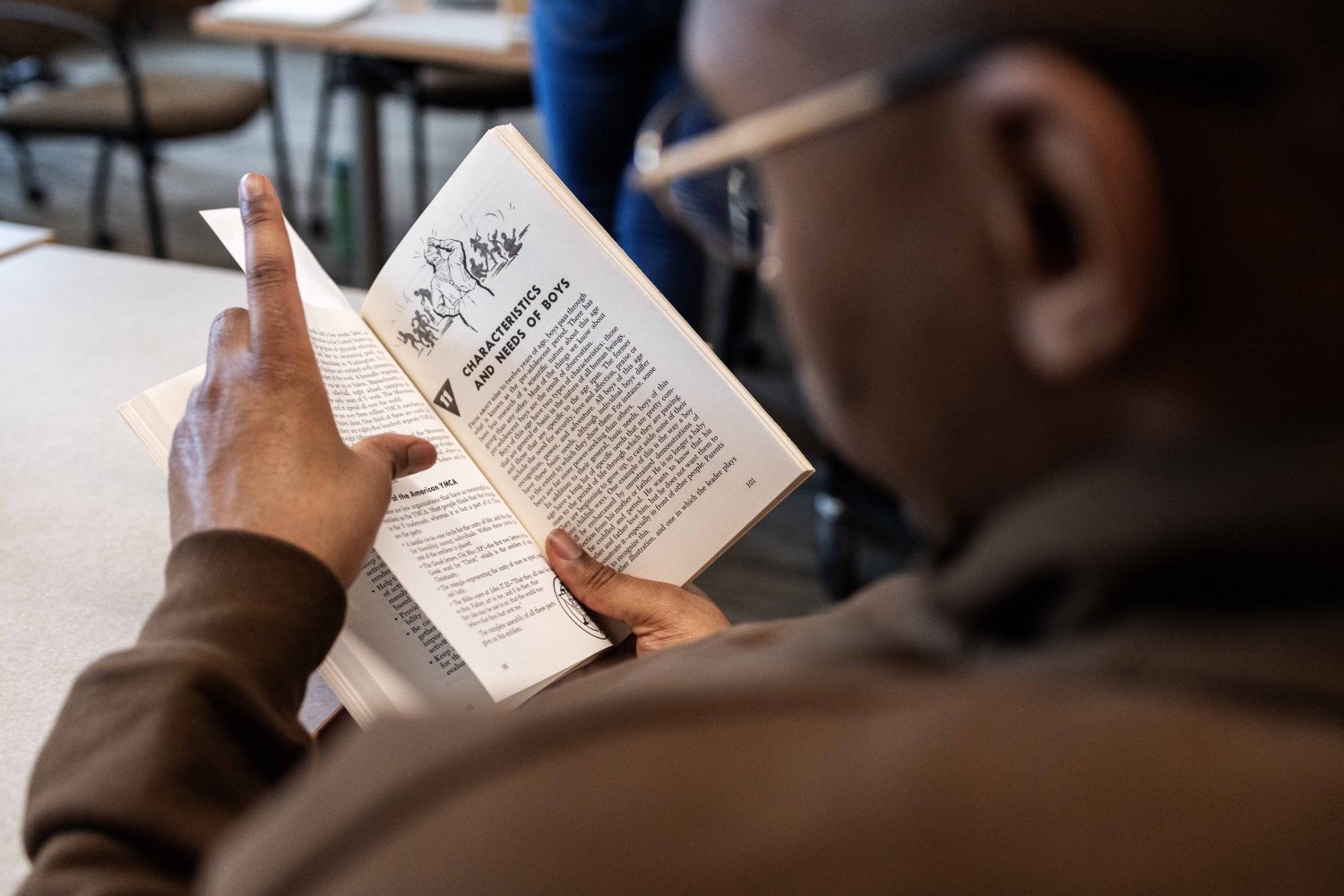
Quentin Francis, director of youth development at the Ann Arbor YMCA in Michigan, reads a book from the Kautz Family YMCA Archives, on Wednesday, April 17, 2024. (Photo/Adria Carpenter)
For example, people tend to think that Black boys are older and more mature than their actual age, he said. This process of “adultification” treats the behaviors of Black boys as more violent and disruptive than that of their peers.
“And when you keep telling a kid that, they start to believe it,” he said. “It’s this self-fulfilling prophecy.”
Youth development leaders need to be aware of their implicit biases and understand that they are kids and deserve grace and the benefit of the doubt. This doesn’t mean that Black boys need to be “coddled,” he said. Leaders can give kids grace while also holding them accountable, explaining why certain behaviors are wrong, and having high expectations.
“All kids deserve to be kids, but you don’t give one group less expectations based on who they are … They need to be molded and taught just like all other groups,” he said. “Otherwise you’re not allowing them to grow in an intentional way. You’re not letting them grow through their mistakes, you’re not teaching them.”
- Michael Cribbs, outreach director at the YMCA of the Iowa Mississippi Valley in Davenport, examines materials from the Givens Collection of African American Literature, on Wednesday, April 17, 2024. (Photo/Adria Carpenter)
- Quentin Francis, director of youth development at the Ann Arbor YMCA in Michigan, examines materials from the Givens Collection of African American Literature, on Wednesday, April 17, 2024. (Photo/Adria Carpenter)
Researching this topic has been a “whirlwind” for Francis. Working with old physical documents requires more care, and digging through materials takes time. He was initially discouraged about the lack of information on BIPOC youth development leaders in the Y, until YMCA Archivist Ryan Bean told him that the absence of information is information.
Sometimes the history and contributions of a marginalized group can be ignored, thrown out, rewritten, and white-washed by the majority. But that absence is also an opportunity to create something new, and this time, the work will be preserved and remembered.
“This fellowship has been a great experience, and something that’s helped me develop the way I approach research,” Francis said.
Having a voice in your community
Lindsey Pullum came into the fellowship to research the YMCA’s Youth and Government program, how it spread across the nation after its first year in 1936, why it spread in those directions, and how it impacted communities of color.
Pullum is the program director for the YMCA Youth and Government, but she was also a participant back in high school. Pullum grew up in Wilmington, North Carolina, and she signed up for the program mostly because all her friends were doing it.
She served as a delegate her first year, and while her bill didn’t make it far, she liked meeting people from other schools and cities. The next year, she worked as a page, running bills between committees and chambers, where she learned the basics of event planning.
While attending North Carolina State University, where she got her bachelor’s degree in political science, Pullum joined the North Carolina Youth and Government College Staff volunteer program.
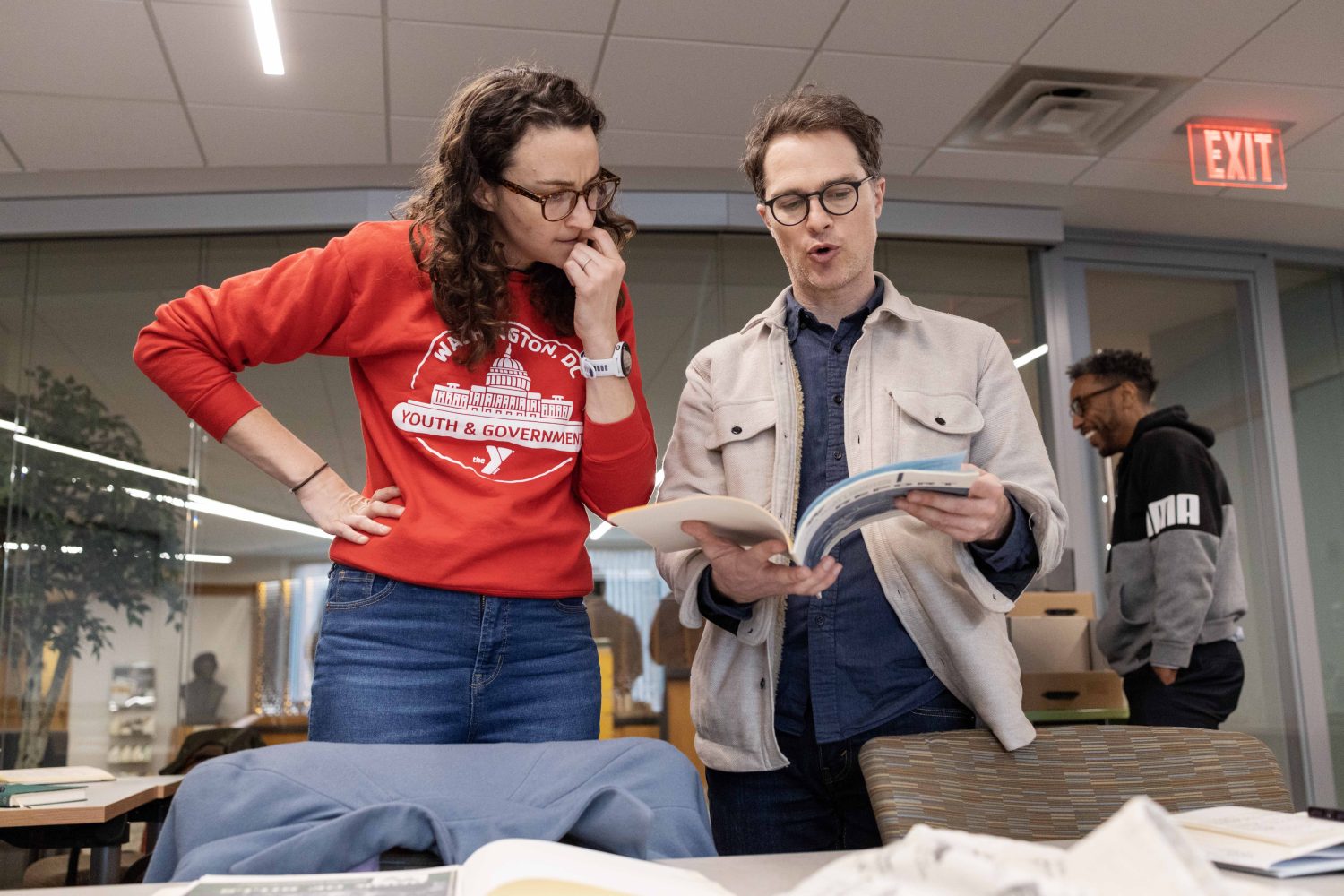
Lindsey Pullum, program director of YMCA Youth and Government, and Cody Hennesy, a computational research librarian at the University of Minnesota, read a book from the Kautz Family YMCA Archives, on Wednesday, April 17, 2024. (Photo/Adria Carpenter)
Pullum never sought out the Y, but it was always there for her when she needed it. So when she finished her doctoral program in anthropology at Indiana University Bloomington, and needed a comfortable place to work, she turned to the Y.
“A ton of people will leave the Y and come back,” she said. “It was just serendipitous that it happened to be for the program I did in high school.”
As program director, Pullum recruits teens from across the Washington, D.C. metropolitan area to learn about civic engagement and how to have a voice in their own communities, whether that’s starting their own high school clubs, learning how to write and debate bills, joining community service organizations, or so on. Since she already worked exclusively with teens, collaborating with BYMOC was a natural fit.
“I was already doing that work, and now I could be more intentional about it. … I was already a big proponent of equity and social justice, so this just felt like the extension of that,” Pullum said. “You don’t have to tell me that minority communities are absolutely ambushed with hard decisions, or no decisions, that leave them worse off.”
Finding the roots of civic engagement
Before Pullum began searching through the archives, tracking the spread of the Youth and Government program, she expected to find that the program had been predominantly populated by rich, white families.
But that’s not what the record reflected. The program cropped up in segregated and desegregated states, and Black communities concurrently promoted civic and democratic work. Black students formed their Hi-Y clubs.
“The answers I’m finding are actually way different than I thought it’d be,” Pullman said.
The driving force behind the program was a perceived urgency to teach democracy to every generation and every race, Pullman explained, coming in response to World War I and the buildup to World War II.
German youth, organizers argued, were extremely devoted to their country because the Nazi Party had invested in youth education for years. So how much stronger would the United States be if it invested in its own youth, teaching democracy as an antidote to Nazism? And with that guiding principle, the program spread to 10 states in 10 years.
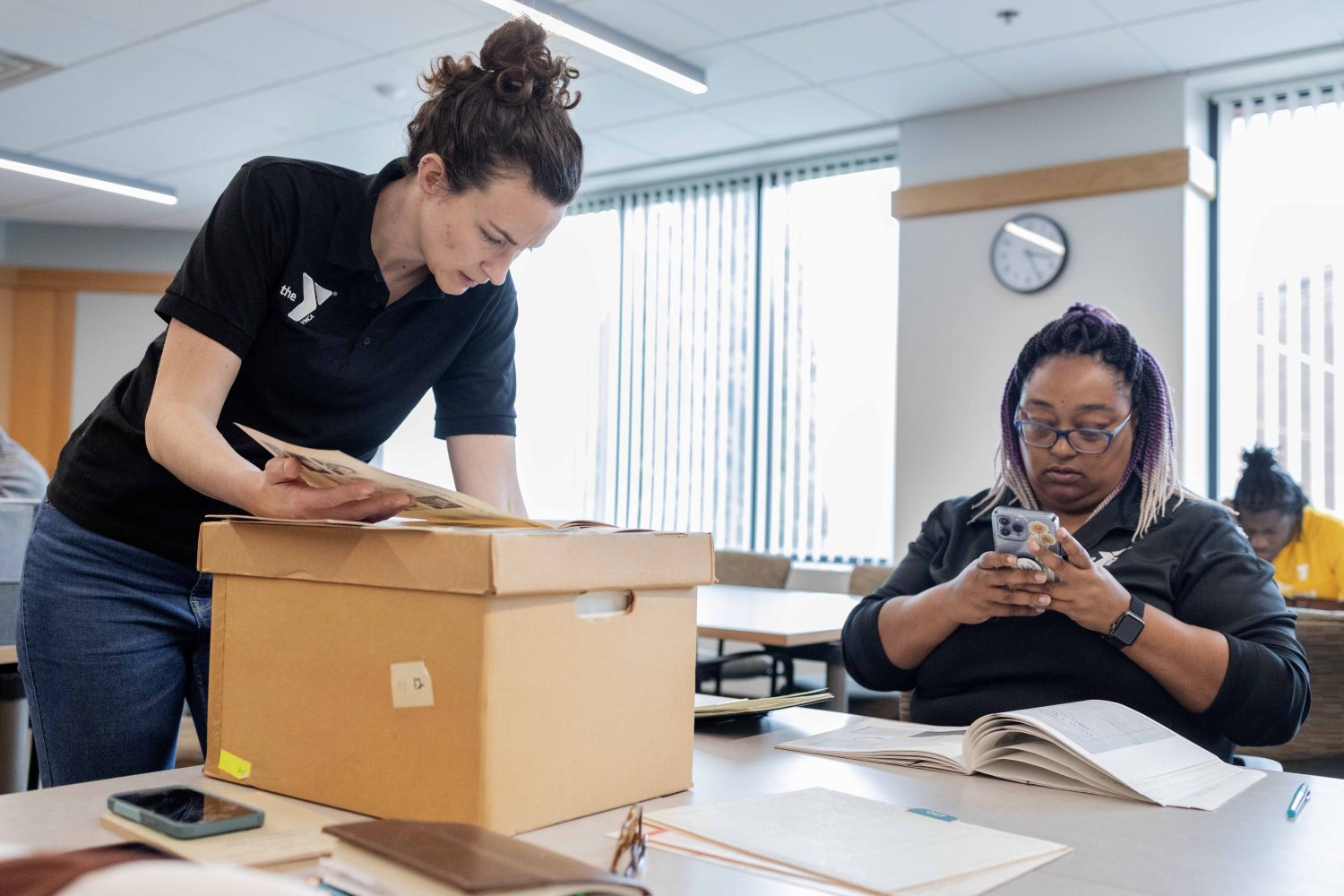
Lindsey Pullum, program director of YMCA Youth and Government, and Jocelyn Woods, teen leadership program director at YMCA of Greater Oklahoma City, Oklahoma, scan through folders from the Kautz Family YMCA Archives, on Wednesday, April 17, 2024. (Photo/Adria Carpenter)
“I didn’t realize how influential World War I was in the whole dynamic of teen programming,” Pullman said. “The through line is that international conflict is shaping national consciousness.”
With her research project, Pullum hopes to provide this historical context to anyone involved with youth and government programming – from Y staff members to state directors, program coordinators and more – so they can be more informed and intentional in their work.
“You can get tied up in the logistical details, and I’m hoping this grounds us in our why,” she said. “It’s not about a big fancy event. It’s about exchanging ideas. And maybe that will help us rethink how to equitably do teen programming.”
For Pullum, working in the archives has been challenging. As an anthropologist, she’s comfortable in the realm of interviews and observations, and the mechanical nature of archival research is unfamiliar, flipping through box after box, not knowing what’s inside or if it’s useful, trying to build a story from those materials, but not holding onto a preconceived narrative.
“When I started picking through things, I was overwhelmed a lot,” she said. “I’ve been challenged both intellectually but also methodologically. It’s kind of a grind. A fun grind, but a grind.”

Lindsey Pullum, program director of YMCA Youth and Government, scans through folders from the Kautz Family YMCA Archives, on Wednesday, April 17, 2024. (Photo/Adria Carpenter)
Pullum, one of a few white people in the room, worried about being an outsider or embodying the white savior archetype. The thought comes up in her job too: how does a white woman recruit young Black boys into civic engagement, especially when they live in over-policed neighborhoods, or whose family has had negative interactions with the government?
The answer, both in the fellowship and in her career, is being in a team. Despite its challenges, working with boys and young men of color has been one of the most fulfilling aspects of her job.
“That’s why this work is so important to me, because it’s so hard, and because it’s actually life or death for a lot of those teen boys,” Pullum said. “My biggest thing now is how to talk about Black civic engagement with way more informed, historical details.”
He’s like Dr. Strange
Michael DeVaul wants BYMOC to build young leaders, to focus on development and not just training, which means investing time and resources in young boys, and in fellowships like these. Diving into the YMCA archives and working with Archivist Ryan Bean, is a necessary component in building programs that solve problems, ones based in prevention rather than intervention.
Bean and DeVaul can honestly interrogate each other’s thought processes without judgment, and Bean knows how to open the archives for others, serving as a catalyst for their curiosity and inquiry, he said.
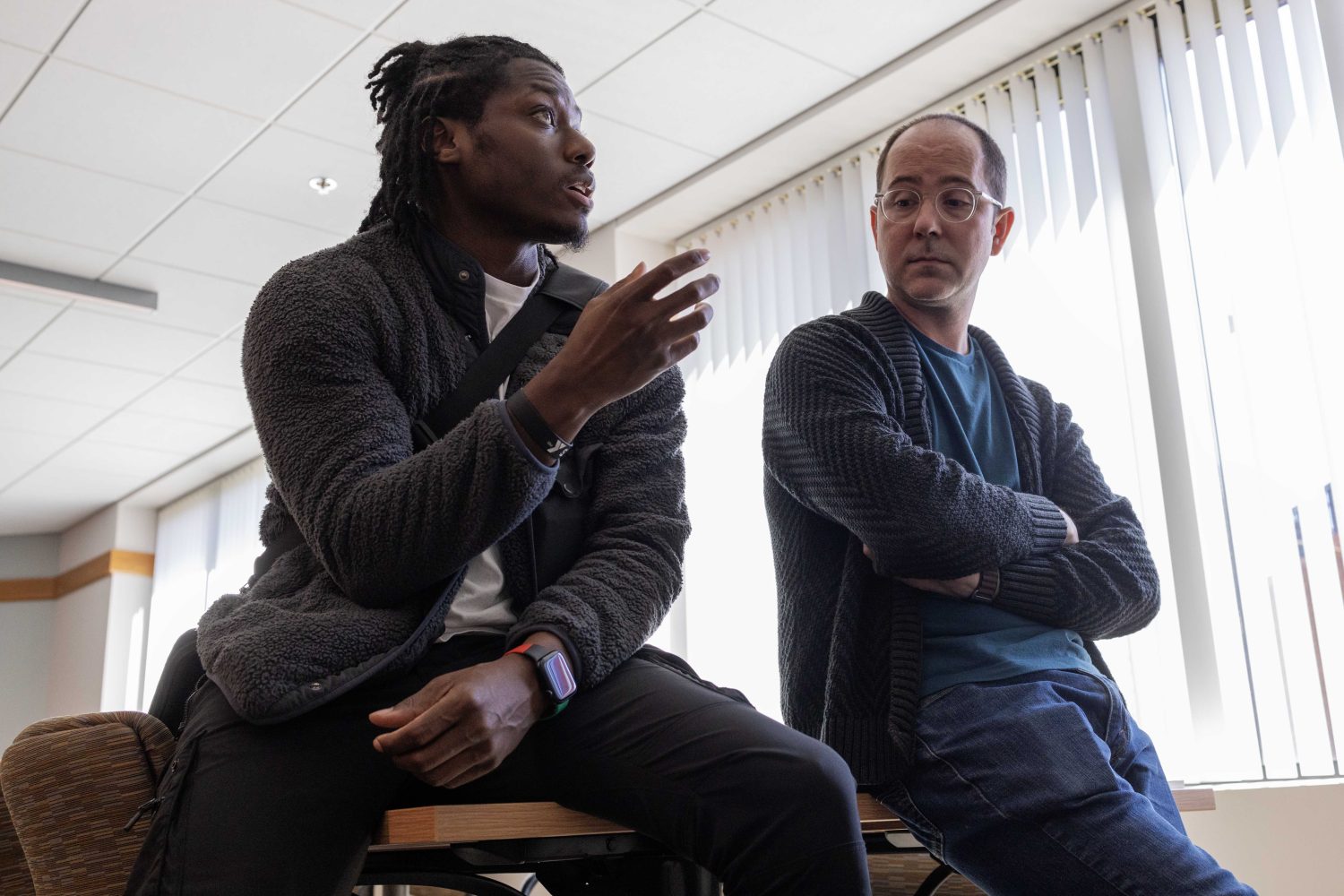
Devin Anglin, national coordinator for Boys and Young Men of Color, speaks with Ryan Bean, archivist for the Kautz Family YMCA Archives, on Thursday April 18, 2024. (Photo/Adria Carpenter)
“I have a deep appreciation for Ryan and his work. I don’t call him Ryan, I call him Dr. Strange,” DeVaul said. “I think we take for granted how much innovation is in the archives.”
Like Dr. Strange, Bean can create a magic portal to any timeframe, reach in and take valuable information from the past. He can pull historical references from memory, immediately connect loose threads, and give them the right guidance, said Devin Anglin, national coordinator for BYMOC.
“Ryan is a conduit to the past,” Anglin said.
- Elijah Megginson, a junior English major at Morehouse College, and Michael Levesque, executive director of Morehouse College’s National Alumni Association, scan through folders from the Kautz Family YMCA Archives, on Wednesday, April 17, 2024. (Photo/Adria Carpenter)
- Davu Seru, curator of the Givens Collection of African American Literature, speaks with the YMCA fellows on Wednesday, April 17, 2024. (Photo/Adria Carpenter)
- Quentin Francis, director of youth development at the Ann Arbor YMCA in Michigan, and other members of the Kautz Family YMCA Archives / YMCA of the USA Research Fellows Program pour through the archives at the University of Minnesota on Wednesday, April 17, 2024. The program aims to use the YMCA’s history to inform and address current challenges related to diversity, equity, and inclusion. (Photo/Adria Carpenter)
- Michael Levesque, executive director of Morehouse College’s National Alumni Association, scans through folders from the Kautz Family YMCA Archives, on Wednesday, April 17, 2024. (Photo/Adria Carpenter)
- Morris “Dino” Robinson Jr., author of “Gatherings: The History and Activities of the Emerson Street Branch YMCA,” talks with Elijah Megginson, a junior English major at Morehouse College, on Wednesday, April 17, 2024. (Photo/Adria Carpenter)
- Davu Seru, curator of the Givens Collection of African American Literature, speaks with the YMCA fellows on Wednesday, April 17, 2024. (Photo/Adria Carpenter)


